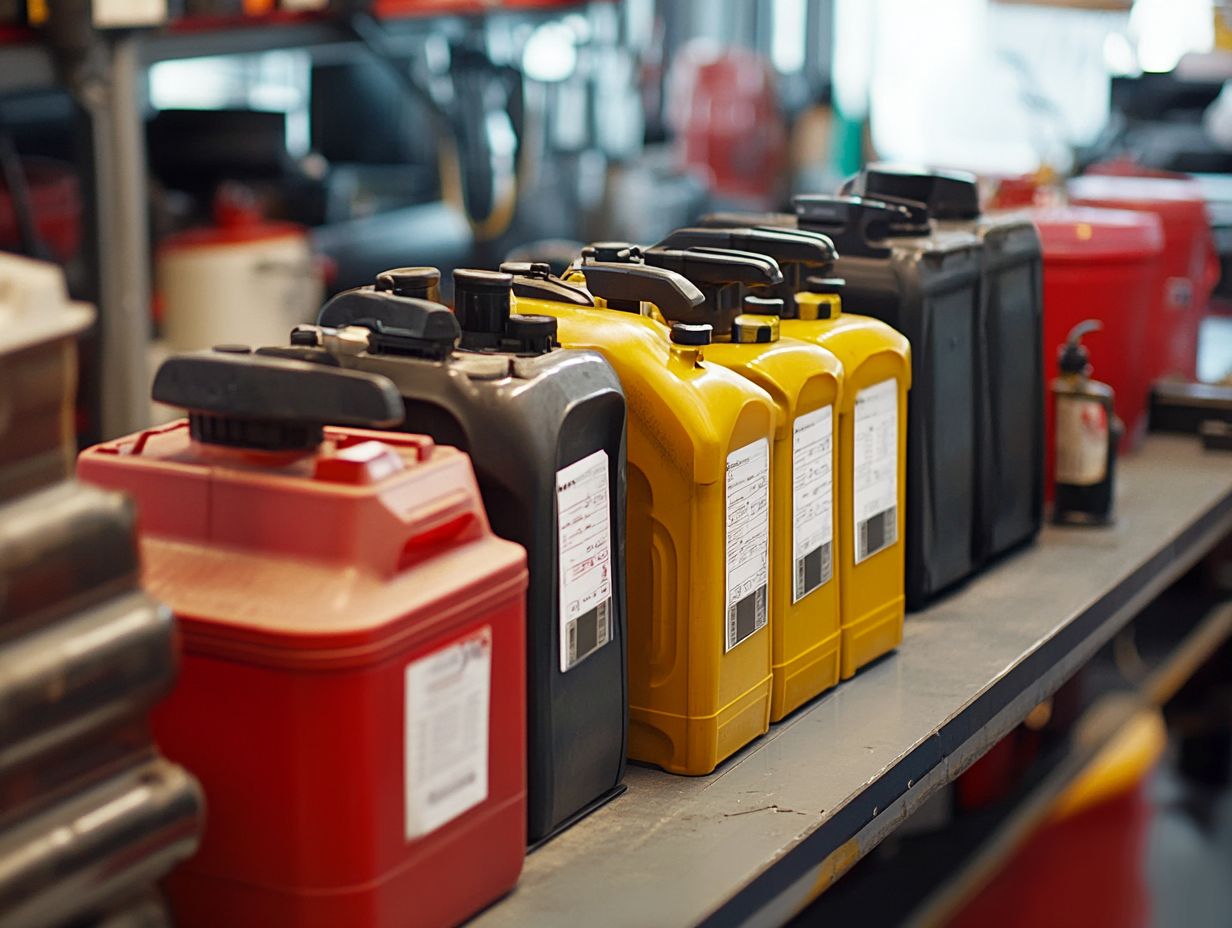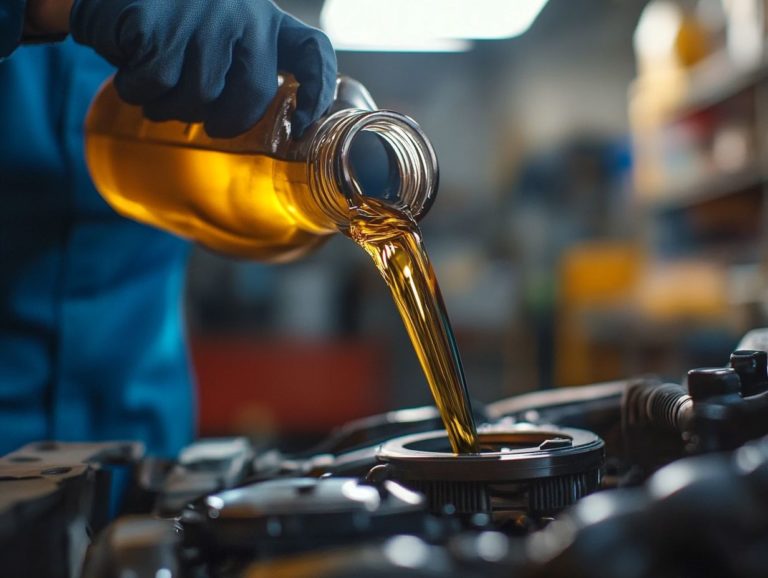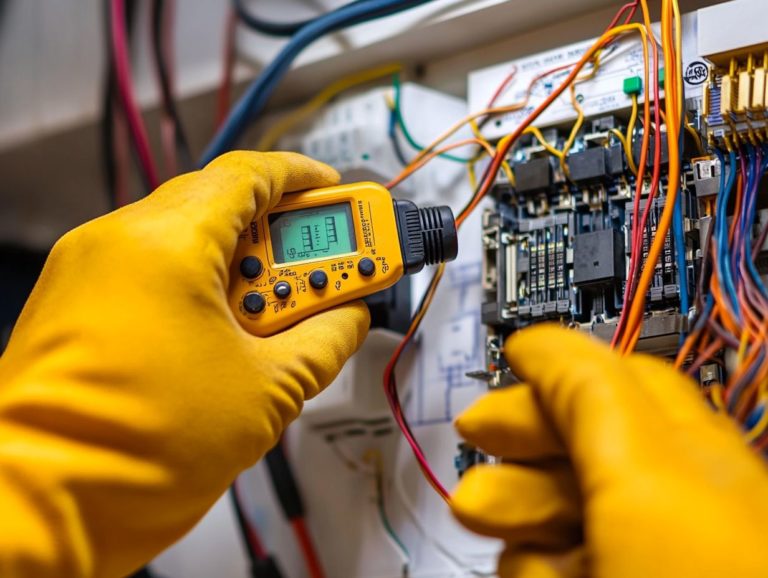What Are Common Car Fluids and Their Functions?
Maintaining your car transcends mere regular check-ups and tire rotations; it involves a deeper understanding of the vital fluids that ensure everything operates seamlessly.
From engine oil to brake fluid, each of these fluids plays a critical role in keeping your vehicle running efficiently and safely. This article delves into the important fluids every car owner ought to know about, highlighting their functions and significance.
Explore the intricacies of these liquids and discover how they contribute to your car’s performance and longevity.
Contents
Key Takeaways:

- Stay ahead of potential issues by frequently checking and changing car fluids for optimal vehicle performance and longevity.
- Engine oil lubricates and protects the engine, coolant regulates temperature, and transmission fluid ensures smooth gear shifts.
- Brake fluid enables safe stopping, power steering fluid assists with steering, and windshield washer fluid keeps your view clear while driving.
Importance of Fluids in Car Maintenance
Maintaining the important fluids in your car is crucial for achieving optimal performance and longevity. These fluids engine oil, transmission fluid, brake fluid, and coolant are vital for ensuring that all the systems within your vehicle operate seamlessly.
By understanding the importance of fluid maintenance, you can prevent costly repairs and significantly extend your vehicle s lifespan. Regularly checking and changing these fluids enhances your driving safety and elevates your overall automotive care and efficiency.
Take engine oil, for instance; it lubricates moving parts, reducing friction and wear. Transmission fluid ensures smooth gear shifts. It’s wise to change your engine oil every 3,000 to 7,500 miles, depending on the type of oil you use, to preserve its protective qualities.
Brake fluid is essential for responsive braking, so inspecting it for clarity and moisture content every couple of years is a must. Don t forget about coolant, which prevents engine overheating. You should check it regularly, top it off as needed, and replace it according to the manufacturer s guidelines.
By staying vigilant with these fluid levels and their qualities, you can greatly enhance your driving experience while safeguarding your investment.
Engine Oil
Engine oil serves as the lifeblood of your vehicle, playing a crucial role in lubrication. It ensures that engine components operate efficiently while safeguarding against wear and tear.
Regular oil changes are essential for maintaining peak performance and extending the engine’s lifespan. Motor oil naturally degrades over time and loses its effectiveness. Prioritizing this maintenance step will lead to smoother drives and a more reliable vehicle.
Function and Importance
Engine oil plays a crucial role in your vehicle’s performance by lubricating engine components to minimize friction. This not only enhances overall efficiency but also ensures a smoother ride.
Engine oil also cools various engine parts by drawing heat away from areas that tend to run hot during operation, preventing overheating and potential damage. This cooling effect is vital for keeping every component functioning seamlessly.
Additionally, engine oil acts as a cleanser by trapping dirt and debris that could otherwise lead to wear and tear. If you neglect regular lubrication, you risk severe consequences, such as engine overheating, increased wear, and engine failure.
Therefore, maintaining optimal motor oil levels is imperative for the long-term health of your vehicle. Regular checks should be a non-negotiable part of your vehicle maintenance routine.
Coolant
Coolant plays a vital role in regulating your engine’s temperature, preventing overheating, and ensuring that various components function efficiently across a range of conditions.
A coolant flush is an essential aspect of automotive maintenance, as it removes contaminants and helps maintain optimal performance for your vehicle.
Check your car’s fluids today and keep your ride smooth and safe!
Role in Regulating Temperature

The primary role of coolant in your vehicle is to regulate engine temperature, ensuring that your engine remains cool and avoids overheating during operation.
This vital fluid circulates through the engine and radiator, expertly absorbing excess heat generated during combustion and helping to manage temperature effectively. As the coolant flows through the engine, it diligently picks up heat, which is then transferred to the radiator, where it dissipates into the atmosphere.
Maintaining an optimal operating temperature is crucial; it not only enhances your engine’s performance but also extends its longevity.
To keep your cooling system in peak condition, regular checks of coolant levels and quality are essential. It’s also wise to adhere to recommended replacement intervals to prevent issues like corrosion or buildup. Ensuring that hoses and connections are in good condition will further bolster overall reliability, giving you peace of mind on the road.
Transmission Fluid
Transmission fluid plays a vital role in the seamless operation of your vehicle’s transmission system, ensuring that gear shifting is optimal and enhances overall performance.
By conducting regular checks and maintenance of your transmission fluid, you can prevent costly repairs down the line and significantly elevate your driving experience.
What it Does and Why It’s Important
Transmission fluid has a key function in your vehicle’s performance, acting as a lubricant for moving parts, generating hydraulic pressure which helps in shifting gears smoothly and cooling the transmission system to keep everything running reliably.
There are several types of transmission fluids automatic, manual, and CVT (continuously variable transmission) each meticulously formulated to serve which specific purpose. Automatic transmission fluids come packed with additives that enhance their resistance to oxidation and improve lubrication, while manual transmission fluids boast higher viscosity, or thickness, to perform better under pressure.
Neglecting these important fluids can lead to serious issues like slipping gears, overheating, and ultimately, transmission failure. Check your fluid level at least once a month. Plan to replace it every 30,000 to 60,000 miles, or according to your vehicle manufacturer s recommendations.
Checking and changing your transmission fluid regularly is a smart move that can significantly prolong the lifespan and efficiency of your transmission system.
Brake Fluid
Brake fluid plays a key function in the effective operation of your vehicle’s brake system, ensuring effective braking.
Maintaining the right brake fluid levels is crucial for your safety. Don t wait until it s too late! Regularly checking the proper levels of brake fluid is essential for ensuring your vehicle performs at its best.
Ensuring Safe Stopping
Ensuring proper brake fluid levels is crucial for safe stopping, as it directly influences the performance of your brake system.
Maintaining brake fluid isn t merely a routine chore; it s a vital component of vehicle safety that can help avert potentially dangerous situations on the road. When air seeps into the brake lines, you might find yourself dealing with a spongy brake pedal, making effective stopping a real challenge.
Moisture contamination can cause corrosion and lower the fluid’s boiling point, which seriously compromises your brake system’s reliability. Regular checks can help you catch these issues early, but you should also stay alert for any unusual sounds or sensations while braking.
It s wise to consult a professional for thorough inspections and timely fluid replacements, ensuring your brake system remains in optimal condition and safeguarding your journey.
Power Steering Fluid

Power steering fluid plays a vital role in ensuring your vehicle s steering operates seamlessly, delivering the necessary pressure for smooth and effortless maneuvering. Regularly checking and maintaining this fluid is essential for achieving optimal handling and safety while driving.
By prioritizing this upkeep, you enhance your driving experience and safeguard your vehicle s performance.
Assisting with Steering Function
Power steering fluid is vital for your vehicle. It reduces the effort needed to turn the steering wheel, improving your driving experience.
This hydraulic fluid amplifies your input, allowing for smoother navigation, especially during <b tight turns or low-speed maneuvers. If fluid levels drop too low, the steering system may become sluggish, making control difficult.
Regular maintenance is essential. Check for leaks, and inspect hoses and connections for wear. It’s crucial to replace the fluid as your vehicle’s manual advises to ensure optimal performance and longevity.
Windshield Washer Fluid
Windshield washer fluid is essential for clarity and safety on the road. It keeps your windshield clean and free of dirt and debris.
Regularly topping up this fluid is part of responsible vehicle care. Ensure your visibility while driving!
Keeping Your Windshield Clean and Clear
A clean windshield is crucial for safe driving. Windshield washer fluid plays an important role in achieving this.
This fluid tackles stubborn grime and enhances the performance of your windshield wipers. By keeping it topped up, you ensure a clear view of the road ahead.
Neglecting this essential fluid can compromise your visibility, especially in bad weather. Regular checks of your washer fluid reservoir help avoid unexpected breakdowns and ensure safe journeys.
Frequently Asked Questions
What Are Common Car Fluids and Their Functions?

There are several common car fluids that play important roles in the functioning of your vehicle. These fluids include engine oil, transmission fluid, brake fluid, coolant, power steering fluid, and windshield washer fluid.
What is the function of engine oil?
Engine oil lubricates the moving parts of the engine, reducing friction and preventing wear. It also helps cool the engine and keeps it clean by trapping dirt and debris.
Why is transmission fluid important?
Transmission fluid is crucial for the smooth operation of your vehicle’s transmission. It provides pressure to shift gears, cools and lubricates the system, and helps prevent corrosion.
What does brake fluid do?
Brake fluid is essential for your car’s brakes. It creates pressure to transfer force from your foot on the brake pedal, allowing you to slow down or stop your vehicle.
Why is coolant necessary?
Coolant, or antifreeze, regulates your engine’s temperature and prevents overheating. It also protects against corrosion and helps maintain optimal engine temperature for better fuel efficiency.
What is the function of power steering fluid?
Power steering fluid provides pressure to assist in turning the steering wheel. It also helps prevent wear and keeps the power steering system running smoothly.
Why do I need windshield washer fluid?
Windshield washer fluid cleans your windshield, ensuring clear visibility while driving. It also has antifreeze properties to prevent freezing in colder temperatures.






